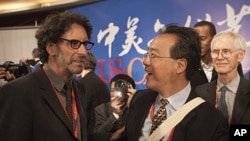As the United States and China continue an ongoing debate about weighty issues of bilateral relations and foreign policy, artists from both countries are gathering in Beijing to share experiences and ideas in this first U.S.-China Forum on the Arts and Culture.
The four-day U.S.-China cultural event opened in Beijing Thursday, as many events in China do, with a ceremony and official speeches. But the attraction for most people was the American luminaries who came to exchange ideas with their Chinese counterparts.
Best-selling novelist Amy Tan, who was born in the United States to Chinese immigrant parents, says some of the images that have influenced her are, in her words, “very much rooted in China.”
“And within these images, I find metaphors and emotional ideas," she said. "I am very interested in a bicultural emotion, a spiritual biculturalism. And I think in that, with imagination and the kind of images that we also share, that we can spur mutual kinds of creativity and imagination.”
Not all the artists have ethnic ties to China. Film director Joel Coen, known for the uniquely American characters in his films such as Fargo, The Big Lebowski and Raising Arizona, said, although he does not intend to incorporate Chinese themes into his movies, he still thinks it is important to learn about the experiences of his colleagues in other countries.
“It's really by exposure to a multiplicity of ideas and people that is sort of a catalyst for a lot of innovation or imagination or whatever it is that you want to describe as sort of the bottom [foundation] of the creative process,” Coen said.
The forum was organized by the Asia Society, the Aspen Institute and the China People's Association for Friendship with Foreign Countries.
The artistic events were overshadowed by developments in the case of well-known dissident artist Ai Weiwei, who was detained earlier this year and just paid a hefty deposit to tax authorities so that he can appeal a huge bill for back taxes.
Ai has said his tax experiences have become his artwork, which Asia Society Museum Director Melissa Chiu says is not surprising.
“I would say that this is very much in keeping with Ai Weiwei's art practice, which has largely since the 1980's been conceptual in nature. Of course, he creates objects, sculptures, installations and now even more recently, architecture," she noted. "But really, it is his interest in ideas above anything else that characterizes his art practice.”
Orville Schell, the director of Asia Society's U.S.-China Relations Center, says he believes these kinds of exchanges are better at building mutual trust than criticizing China for harassing Ai Weiwei or jailing Nobel Peace prize winner Liu Xiaobo.
“The real power of innovation and creativity comes from letting people breathe, and letting them think out loud - not telling them what to think, how to think, what's dangerous, what's not," Schell stated. "And I think that if, in some small way, without necessarily sticking fingers in anybody's eyes about Ai Weiwei or Liu Xiaobo, which we all have our views on, to just show them in some way, the process of cultural people thinking out loud, being in public, feeling uncensored and uncontrolled.”
Other American luminaries scheduled to attend the Beijing event include actress Meryl Streep and chef Alice Waters. They will be joined on various panel discussions with Chinese artists, including film directors Lu Chuan and He Ping, actor Liu Ye and artists Liu Xiaodong and Xu Bing.




